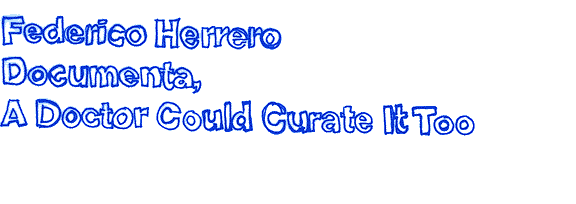|
|
|
|
|
|
A new window has opened. If it has not please click here. |

Yes, a doctor could curate it too. Because we are playing this game of infinite reorganization, we are very tolerant of this infinite progress. Now our consciousness is permitting the blurring between various fields and the direction of social forms: it all seems to be settled as a platform. Opposed to the notion of perpetual renewal, of infinite progress, there is the sense of the here and the now. There is also a strong need to connect (with other people) rather than to express ones own ideas. Then I wonder whether the exhibition can be as strong as the links it can enhance. Would it matter then what is the background or profession of the person who will curate an exhibition?
I don’t think an artist should curate Documenta. That would not make any difference, and I think the reason for this is mostly because there is not really a distinction between an artist and a curator. There is already a structure, a platform, in place that could be used in a different way. At this point there is the possibility of making a stronger differentiation between art production, which is predominantly dominated by object making, which often follows from a previous action. Then it would be important to recognize the value of this action on its own. This implies the practice of a kind of process that is not physical, regardless of the implications of the ways in which the work is deployed later on (once it has been documented), there is at this point a strong sense of the implications of the actions on their own. This format, which has to do more with the production of ideas, has been growing alongside projects that deal with the blurring of boundaries between fields, and specifically with the different social forms as mediums for society.
¶ 02/02Documenta could begin to function as a detonator for a new means of productivity more related to the production of ideas geared toward stimulating or resolving many social problems. In that case an artist could be rewarded for the impact or repercussion of an idea once it has been applied to reality. This means accepting that immaterial production, together with the circulation of information, are at this point very important fields of exchange in emerging societies, including non-geographical societies or webs of exchange.
Exhibitions like Documenta, which in a way resemble transnational companies, function as central structures working like a centrifugal force, and this generates a huge web of connections and collaborations, a base for immaterial production. The promotion of social situations, the invention of concepts that can improve the social - humanitarian aspect emerge from the idea of the artist as no longer a visionary, but a person who knows how to use the platform of contemporary art as a tool for us to achieve a better sense of reality.
xxxxxxxxxxxxxxxxxxxx